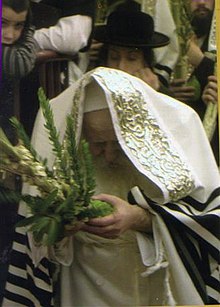

| Psalm 117 | |
|---|---|
| "O praise the LORD, all ye nations: praise him, all ye people." | |

Psalm 117, from the Wolfcoz Psalter, c. 820 – 830
| |
| Other name |
|
| Language | Hebrew (original) |
Psalm 117 is the 117th psalm of the Book of Psalms, beginning in English in the King James Version: "O praise the LORD, all ye nations: praise him, all ye people." In Latin, it is known as Laudate Dominum.[1] Consisting of only two verses, Psalm 117 is the shortest psalm and also the shortest chapter in the whole Bible. It is joined with Psalm 118 in the manuscripts of the Hebraist scholars Benjamin Kennicott and Giovanni Bernardo De Rossi.[2]
In the slightly different numbering system in the Greek Septuagint and the Latin Vulgate version of the Bible, this psalm is Psalm 116.
With just two verses, seventeen words, and 62 characters (29 in verse 1 and 33 in verse 2) in Hebrew, it is the shortest psalm in the Book of Psalms. It is also the shortest chapter in the whole Bible. It is the 595th of the 1,189 chapters of the King James Version of the Bible, making it the middle chapter of this version.
In Hebrew, it is an acrostic poem and is one of the so-called Egyptian Hallel prayers.
The following table shows the Hebrew text[3][4] of the Psalm with vowels alongside an English translation based upon the JPS 1917 translation (now in the public domain).
| Verse | Hebrew | English translation (JPS 1917) |
|---|---|---|
| 1 | הַֽלְל֣וּ אֶת־יְ֭הֹוָה כׇּל־גּוֹיִ֑ם שַׁ֝בְּח֗וּהוּ כׇּל־הָאֻמִּֽים׃ | O praise the LORD, all ye nations; Laud Him, all ye peoples. |
| 2 | כִּ֥י גָ֘בַ֤ר עָלֵ֨ינוּ ׀ חַסְדּ֗וֹ וֶאֱמֶת־יְהֹוָ֥ה לְעוֹלָ֗ם הַֽלְלוּ־יָֽהּ׃ | For His mercy is great toward us; And the truth of the LORD endureth for ever. Hallelujah. |
O
praise the LORD, all ye nations:
praise him, all ye people.
2 For his merciful kindness is great to-
ward us: and the truth of the LORD
endureth for ever. Praise ye the LORD.— Psalm 117 in Benjamin Blayney's 1769 standard text of the King James Version

In Psalm 117, the gentiles are invited to join in praise of God. Christians view this as a fulfillment of God's promise of mercy to the gentiles, pointing to God's promise that all nations would be blessed in the seed of Abraham, who they believe is Christ, as described in the Letter to the Galatians.
Galatians 3:16 says "Now to Abraham and his seed were the promises made. He saith not, And to seeds, as of many; but as of one, And to thy seed, which is Christ." Verse 1 is quoted in Romans 15:11.[5]
In the Catholic Church, the Rule of Saint Benedict assigns this psalm (116 in the Vulgate) to the Office of Vespers on Monday. Saint Benedict of Nursia generally used four psalms in vespers, but because of the shortness of this psalm, he added a fifth when it was used. It is currently used in the Liturgy of the Hours on Saturday of Weeks I and III. The psalm may be sung after Benediction of the Blessed Sacrament, a ritual performed in Catholic[6] and some Anglican churches.[7]

Psalm 117, known by the opening words in Latin as Laudate dominum (translated "O, Praise the Lord" or "Praise ye the Lord"), has been set to music by a number of composers, including William Byrd,[8] Marc-Antoine Charpentier (7 settings: H.177, H.152, H.159, H.182, H.214, H.223, H.224), Michel Richard Delalande,[9] and Johann Sebastian Bach (Lobet den Herrn, alle Heiden, BWV 230). Heinrich Schütz composed a metered paraphrase of the psalm in German, Lobt Gott mit Schall, ihr Heiden all, SWV 215, for the Becker Psalter, published first in 1628. Wolfgang Amadeus Mozart wrote an adaptation of this psalm for solo soprano voice and chorus: the fifth movement of Vesperae solennes de confessore ("Solemn Vespers for a Confessor"), K. 339.[10]
Alan Hovhaness set portions of it, along with Psalm 27, in his 1935 work "The God of Glory Thundereth".[11] The American Jewish musician Robert Strassburg (1915 – 2003) also wrote an adaptation.[12] More recently, it has been set by the Swedish composer Fredrik Sixten. The psalm also forms the introduction of the 90s pop song Happy Nation by Swedish pop group Ace of Base,[citation needed] and a popular arrangement from the Taizé Community.[13][14]